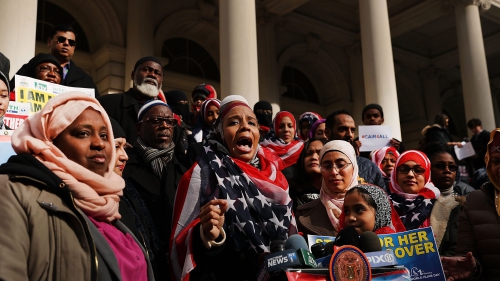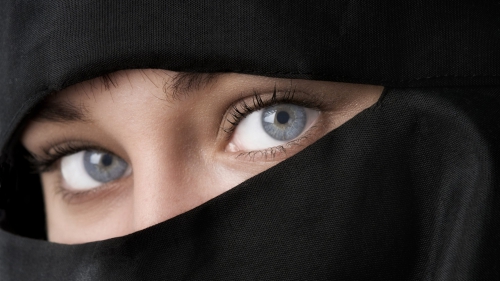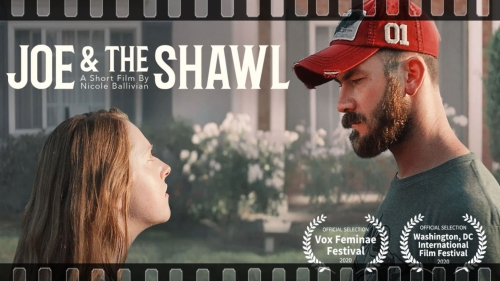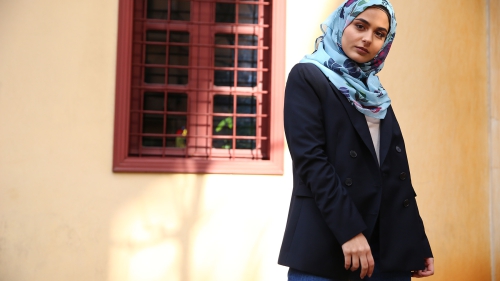The Law of Veils

Here they go again. Muslims just don't give up trying to change our values and roll back hard fought rights of equality and justice. Though this time, we may have nipped it in the bud early - but should we?
Ontario Court Justice Norris Weisman's "admittedly difficult decision" to force a complainant to testify without her niqab, or face covering, in a sexual assault case has unleashed a torrent of discussion and debate. Again, the usual suspects with too little knowledge, appreciation or understanding of the complexities of the issue have jumped into the fray.
The ruling once again brings to the fore questions surrounding the limits of accommodation in a liberal multicultural society. But this time, in a novel twist, the clash pits a person's religious right with the right of a defendant in a criminal trial to due process and procedural fairness; namely that of being able to face his or her accuser in open court. Obviously, both are important rights in a liberal democracy.
The niqab - which a small fraction of orthodox Muslim women use to cover their faces, and not to be confused with the hijab or head covering - is attacked by some as a symbol of oppression. By others as a badge of political Islam. By others as a public-relations nightmare for their "moderate" or more palatable versions of Islam. By others as something that should be compromised in the two-way dance of accommodation. And still by others as not compulsory or even totally unnecessary from a strict Islamic legal point of view.
True, the vast majority of Islamic scholars do not believe it is fard, or compulsory. A few acknowledge that it is recommended. And a very small fringe believe it is compulsory. But even these jurists will defer to Islamic rules of necessity (darura) and public interest (maslaha) to sanction its removal in certain official and medical contexts; ranging from identification to security needs.
It is also interesting to note that scholars are unanimous in holding that the face must be uncovered during circumambulation of the Kaaba in Mecca, during what is arguably considered a peak moment of Islamic spirituality.
Many non-Muslims are quick to oppose this practice, to borrow the idea and phrase coined by Professor Sherene Razack, "to rescue the imperiled Muslim woman." Sadly, many Muslims are also quick to speak out against this woman's right to practice her religion as she believes it should be. Understandably, they are worried about the potential backlash from mainstream society.
All of these people miss the point though, and there is a need to think through the issue in a more holistic manner. The question of the niqab in court must be tackled without resorting to fear and reductionism.
First, from the religious rights perspective, the law is clear and logically consistent with the core values of liberal democracy. In Syndicat Northcrest v. Amselem, a case that tackled the definition of freedom of religion under the Quebec Charter of Human Rights and Freedoms and Section 2 of the Canadian Charter of Rights and Freedoms, the majority accepted a definition that included any practice the individual sincerely feels is connected to religion, regardless of whether the practice is required, sanctioned or mandated by a religious authority. In other words, a person who claims rights to freedom of religion does not need to demonstrate that they were denied rights to worship in accordance with the manner required by a religious authority. Building on prior case law, the Court held that it was enough to demonstrate an individual's religious belief and that the practice was connected to this belief - though practices sanctioned or required by religious authorities are also protected.
The reasoning was consistent with the desire to ensure that secular governments and courts should not be placed in the position to determine which religious practices are authentic or not.
To determine whether an individual belief is sincere, the Court followed the American lead in advocating for a minimally intrusive evaluation of an individual's beliefs. Courts must only determine that religious claims are made in good faith and not feigned. The majority also held that courts should tolerate changes in beliefs; the individual's beliefs held in the past or from time to time are not relevant to those claimed in the present.
From a religious rights perspective, the woman has a clear right to testify with her niqab. The judge seems to have discounted the significance of her belief because she was not unequivocal in stating how much she believed in it. Surely she cannot be expected to communicate the technical legal standard she needs to meet, particularly given that English may not be her mother tongue. Clearly, as the record and context show, she had a genuine belief in it even though she may not have used accurate language to convey her conviction.
Contrary to what some have argued, exposing her face for her driver's license photograph in the past does not void her right to insist on it in the present, as the Supreme Court clearly articulated. Moreover, this cannot be equated to open and public testimony in the presence of numerous men and the added stress of courtroom formality.
Muslim groups and individuals - well-intentioned but misguided and trying to champion a better public relations image for Islam and Muslims - clamoring to distance themselves from the issue must understand that religion is something personal. In line with the Supreme Court decision, it must be defended on a personal level. They must ask whether they really want to start allowing external forces and/or even others from within to dictate what of one's religion is mandatory and what is not.
Today it is her niqab, tomorrow it will be her hijab, next it will be his beard and eventually it will be your right to educate your children in religious schools, which are teaching "hate" and "un-Canadian" values if you believe some of the anti-Muslim and anti-religion rhetoric that passes for debate and informed comment on Muslims and Islam.
The latter is not as far-fetched as some may think, if you recall some of the rhetoric and hysteria during the Ontario provincial election when the Conservatives were effectively defeated over the private school funding idea, partly because of the specter of Islamic schools receiving tax dollars.
The defense lawyer in the case in which the woman is a witness has argued that allowing the woman to testify with the niqab will prejudice the ability to assess her credibility. He argued that it was of "critical importance" to be able to see her face. The lawyer is obviously doing his job, but society and the justice system needs to look deeper, beyond legal strategy.
First, assessing credibility through demeanor evidence is not something solely assessed from someone's face. Those present in court will still hear her voice (including the inflections, tone, pauses, etc.); the content of her testimony (conviction, nuances, consistency, hesitations, etc.); and see her eyes and body language. Moreover, the judge can question her and the defense also has the right to cross-examine her, with the latter being the most effective and reliable tool to assess credibility.
Second, contrary to conventional wisdom, scholarly and judicial decisions have also questioned the efficacy of assessing credibility using demeanor evidence. There are numerous studies and reports challenging the reliability of demeanor evidence in assessing credibility, particularly when it comes to cultural, linguistic, racial and religious minorities.
Of course, it is imperative for the judicial system to explore ways in which the procedural fairness of the accused can be respected while respecting religious rights and striving to remove cultural/religious barriers to access to justice. When such issues are merely brought up as technical legal arguments without substantiation, the system must not uncritically accept them, particularly when they clash with complex and conflicting rights and public policy imperatives.
Indeed, this case raises serious public policy concerns beyond those already touched upon. Even if technical Islamic and legal rules can be used to deny her the right to testify with her face covered, the decision sets a dangerous precedent in terms of access to justice and possibly discouraging women in such situations from coming forward. As ably argued by the woman's lawyer, courtroom testimony is extremely difficult and often traumatic for the average person. Now throw in the compounded hardships for sexual assault victims and the additional cultural and religious hurdles and many women may not come forward to report such assaults.
As a relative of the woman told the press: "This is primarily an issue of protection the court offers to victims of sexual assault, especially those from minority communities, who experience the added stigma of bringing these deeply personal issues into open court."
As the Law Reform Commission of New Zealand concluded in its 1997 report titled Evidence Law: Character and Credibility: "To misinterpret the demeanor of a witness is always a danger, but it is a particular danger when the fact-finder is confronted with a witness belonging to a different culture ..."
Maybe this time the niqab will be a catalyst to start to question the reliability of using demeanor to assess credibility in a multicultural context. Let's not nip it in the bud, but rather step back and analyze these issues without resort to reductionism.
Faisal Kutty is general counsel for the Canadian Muslim Civil Liberties Association and an adjunct professor at Osgoode Hall Law School of York University.
Topics: Hijab (Head Cover), Veil (Burqa)
Views: 5665
Related Suggestions
If the person in question is both the witness, and the victim, then by convention, they are just refered to as 'the victim'. It is very strange to refer to them by two separate titles as done here. I'm not saying that you are wrong, but I am saying that this is a very awkward way of writing.
As far as I know, Ontario law allows the cross-examination of a witness from behind a screen when the witness is under the age of 18. Not the case here.
Your history lesson on Sharia law, and your explanation about where you live is interesting... Tell me this - out of your 'five Sharia laws', which one has a one-to-one valuation of women vs men's testimony? I may not know all there is to know about Sharia Law, but I know enough about Islam to know the answer to that question already. I also know enough about the Islamic inheritance laws to know that they are incredibly messed up due to *cough* somebody not being able to add fractions.
For the record, I don't think that there should be Jewish or Catholic-specific legal options either. Your comments about 'stoning' and the Inquisition are very telling though. BTW, you might want to talk to some of your co-religionists about their thoughts on stoning adulterers before you get on about the Jews. I'm pretty sure the Jewish folks have abandoned the practice though.
Your bit about the Native Americans is irrelevant. You didn't immigrate to a Native American country. As you imply, probably without realizing it, Canada is a Western country with Western values. When minority values come in direct conflict with those of the host, the minority loses. Period. As I mentioned in my previous post, the court has already determined that freedom of religion is OK until it conflicts with someone else's rights. It's not about 'me forcing them to dress to my liking', which is a pretty bizarre statement for you to make.
You 're wrong. In fact there a programme on TV (Michael Coren's show). Even Michael Coren who is anti-Muslim says that the Muslim woman with the Niqab is both the witness and the victim.
You made Sharia Law look homogenous when it's not; it's not the highly respected author & York University Law professor Faisal Kutty who is misleading us may be you are unless you don't know that there are five schools of Fiqh in Islam & there are Sharia Laws not just one Sharia Law. Which Sharia Law are you talking about that of the literalist Salafi Taliban & Saudi Wahabis or that of the Shia or the Sufis. Besides, some clauses of Sharia laws are limited to time and space & are inspired by tradition like any other man made laws i.e Napoleon's French laws. Also, they may not necessarily be inspired by the Quran or the Sunnah or Al-Ijma but may be the result of Qiyyas & plain URF aka (Ma'roof -good traditions). They are open to interpretations & Muslim scholars are human, they make mistakes too like all other non- Muslim law scholars. Furthermore, I live 10 minutes drive from where Professor Kutty teaches and I went to York University myself. It has the best law programme in Ontario.
You need to understand that Islamophobia is not a claim. It's real. If the Jews that started the tradition of stoning the adulterer to death & the Catholics that started the Inquisition can have their court system in Ontario why can't Muslims have one. We are not all Taliban & we don't plan to set up a judicial system where Muslim women would be victims. All Toronto Muslims demanded was to have a fraction of the Sharia; clauses that deal with family and personal affairs such as marriage, divorce, inheritance etc.
Allyson has a good point it's neither about Islam or Secularism or Niqab (that I don't agree with btw) . It's about the freedom to practise one's faith...
First, the article tries to intentionally mislead about the woman in question. Was she assualted, or a witness to the assault? Saying that the woman in question is the 'complainant' in a sexual assault case makes it sound like she was the victim, however, reading down farther, we see:
"The defence lawyer in the case in which the woman is a witness", which states that the woman is a 'witness', not the victim. At least one other comment on this article assumes we're talking about the victim, not a witness, and frankly I did too at first.
Next, there is the comparison to Syndicat Northcrest v. Amselem. Or at least part of Syndicat Northcrest v. Amselem. There is one point in the case where the judge tries to determine what is meant by freedom of religion, and part of that is determining if an individual belief is sincere. It's not the crux of the case, however, as this article would lead you to believe. In the case, the Supreme Court noted freedom of religion should not work to deny the rights of others. In other words, the Syndicat Northcrest v. Amselem case agrees with the decision in question here - the right of a defendant 'being able to face his or her accuser in open court' takes precedence.
Of course, the elephant in the room is Sharia law. I wonder what the author's opinion is regarding this poor woman's testimony. Is it worth 1/2 that of a man's? Should there be a requirement for four woman testifying that the assualt took place, and if there are not, should the case be thrown out of court? Something to think about before towing the 'poor us' party line.
Quran 16:125
Invite (all) to the Way of thy Lord with wisdom and beautiful exhortation; and argue with them in ways that are best and most gracious: for thy Lord knoweth best, who have strayed from His Path, and who receive guidance.
Quran 3:114
They believe in God and the Last Day; they enjoin what is right, and forbid what is wrong; and they hasten (in emulation) in (all) good works: They are in the ranks of the righteous.
First, assessing credibility through demeanour evidence is not something solely assessed from someone's face. Those present in court will still hear her voice (including the inflections, tone, pauses, etc.); the content of her testimony (conviction, nuances, consistency, hesitations, etc.); and see her eyes and body language. Moreover, the judge can question her and the defence also has the right to cross-examine her, with the latter being the most effective and reliable tool to assess credibility. Her personality was never going to change just because she took off her niqab i believe it is the victim that was ridiculed and abused for a second time what gives us the right she was not on trialj, being in a court is in front of your attacker is enough of a scarey exprirence without having to compromise yourself in any other way.
The death of the West wont come from some mighty blow, but from a thousand little cuts.... most of which will be self-inflicted! Now, everyone grab onto the frayed edges of our society and pull!!!!

















